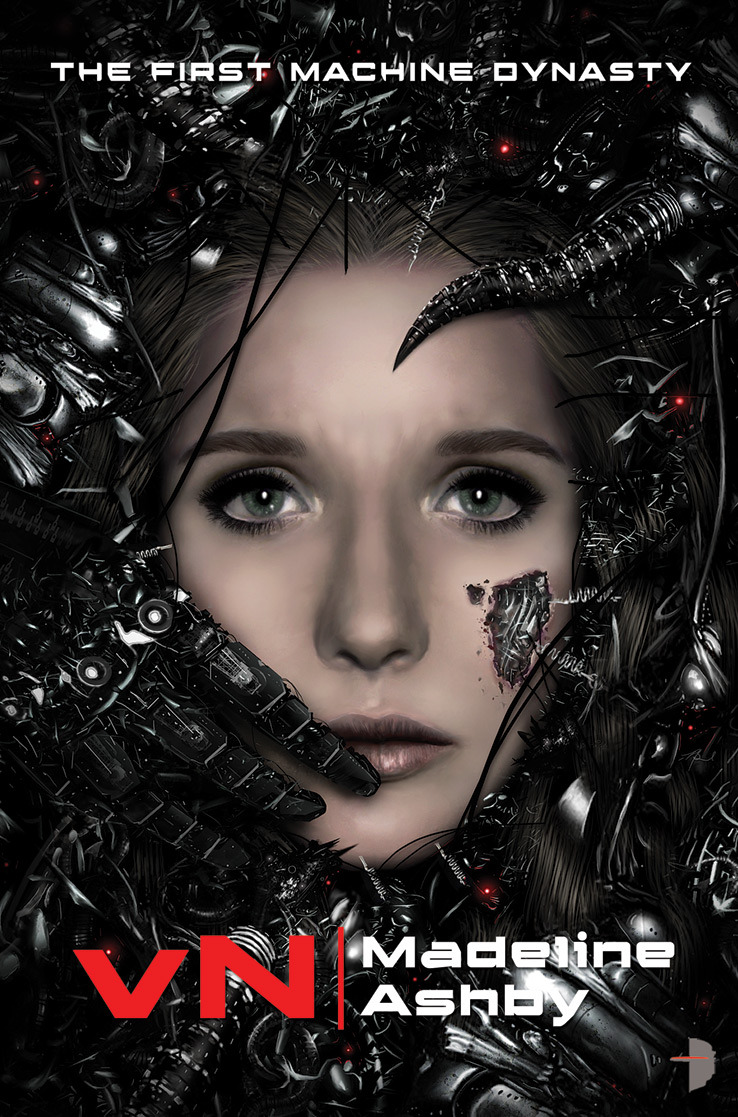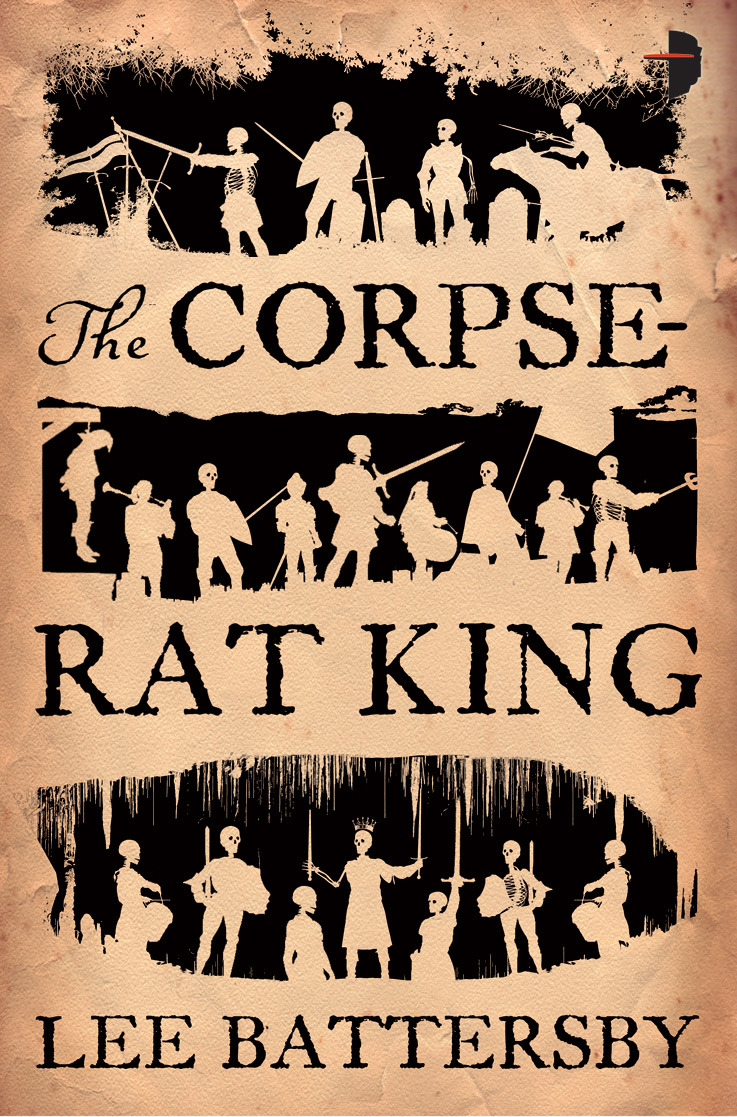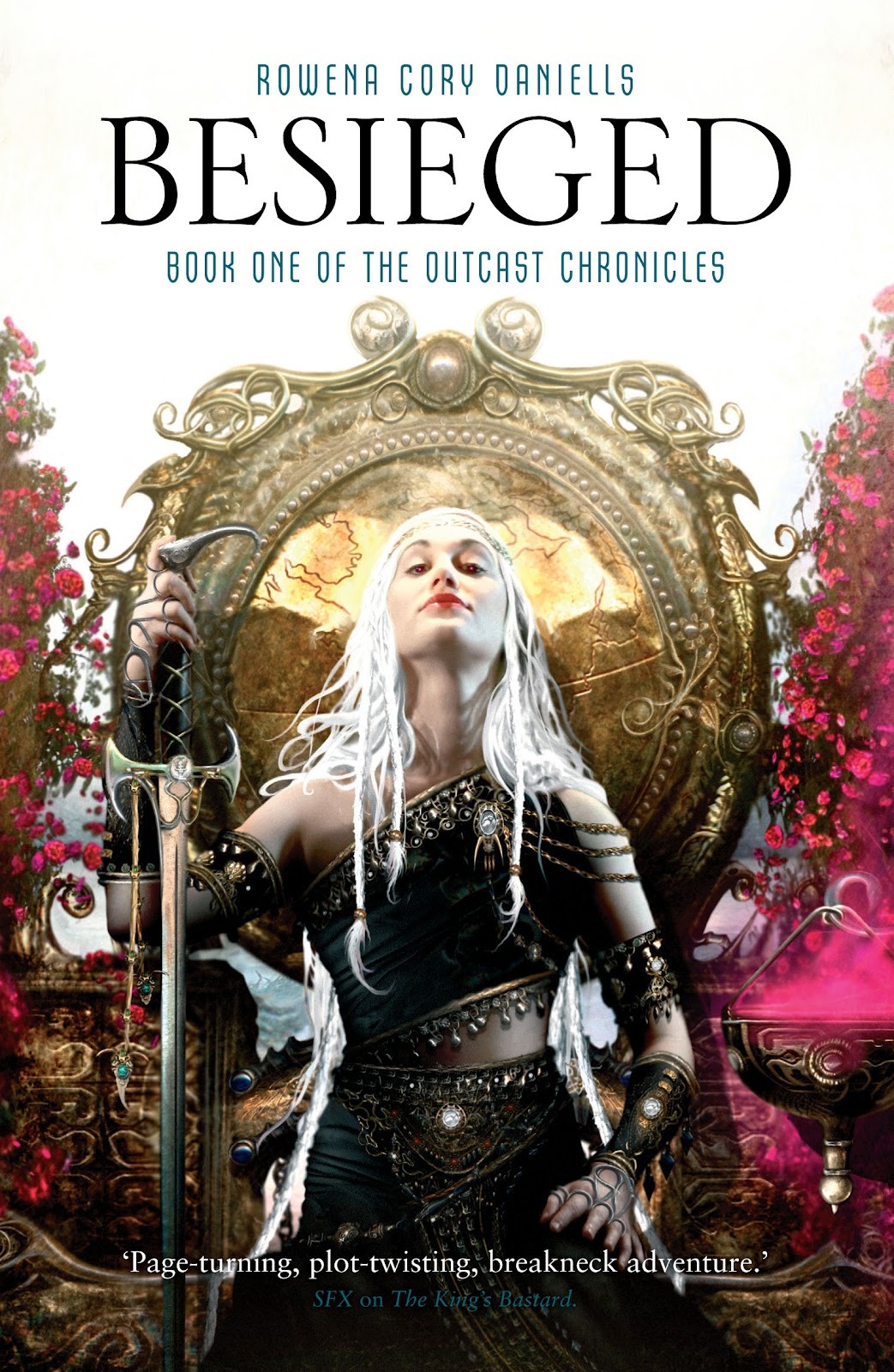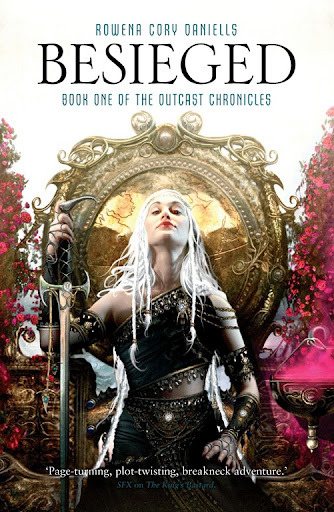 Besieged by Rowena Cory Daniells is the first book in the Outcast Chronicles, which is being published around now (Solaris likes to release trilogies over three months). It’s set in the same universe as her Last T’en trilogy (which is out of print and difficult to find) but in that world’s distant past. You definitely don’t need to have read The Last T’en first (I certainly haven’t, what with being unable to get a hold of it). A copy of Besieged was given to me by the author for review.
Besieged by Rowena Cory Daniells is the first book in the Outcast Chronicles, which is being published around now (Solaris likes to release trilogies over three months). It’s set in the same universe as her Last T’en trilogy (which is out of print and difficult to find) but in that world’s distant past. You definitely don’t need to have read The Last T’en first (I certainly haven’t, what with being unable to get a hold of it). A copy of Besieged was given to me by the author for review.
I absolutely loved Daniells’s previous (and completely unrelated) trilogy, King Rolen’s Kin. The Outcast Chronicles (judging by the first book, anyway) is quite different in the way the story is told. Where KRK followed a few characters closely over a relatively short period of time, Besieged has a much larger cast of point of view characters and spans a much longer period of time — about 25 years. I felt it was as much the story of kingdoms/their equivalents and ideas as it was the story of the individual characters. They all play important parts, but the real story is in the overall tapestry, not each thread.
Of course, spanning 25 years means there need to be some time jumps and I was fascinated by the way Daniells managed them. Among other things (such as just jumping forward a handful of years when nothing happened), all the literal journeys are skipped. Given how much the travelling from A to B journey is a staple of fantasy, it was interesting to see them skipped. Of course, there was no reason not to skip them (the interesting things all happened after people got wherever they were going), but I found it unusual enough to warrant a mention.
The societies in this world were fascinating. There are the T’en who have magic powers and who live in a very structured society. Female T’en have stronger magic than males do and so their society is mostly controlled by women and men and women live segregated lives. Men are forced to give up their pure blood children (which might result from a couple consisting of a half T’en half human and a full T’en) to the women, who raise them and then return the boy-children when they come of age. Many of the men fear and resent the women for the power the wield over their lives.
Half-breeds, if they’re lucky, live with full-blooded T’en. They have no magic of their own but can sense it. They also look different (like T’en they have six fingers or toes on each limb) and copper-coloured hair. They are accepted as sort of servants in T’en society.
Then there are the ordinary humans who are old fashioned in their attitudes towards women and fear anything to do with magic. Occasionally a genetic throwback causes a half-breed to be born to two human parents and then the child is lucky if it’s given to the T’en and the mother is lucky if she isn’t killed.
The different power dynamics, especially the gendered ones, are in stark contrast between humans and T’en. But at the same time, there’s not that much difference in how the male T’en view women to the humans, they just can’t express it properly. Honestly, it’s an interesting read for the gender politics alone, but there is much more to the story than just that.
Like the characters! Although there was a large cast, I didn’t have any trouble keeping them straight in my mind. Even the few longish “fantasy” names used were distinct enough to avoid confusing. Each character was well drawn and realistic. Because there were time jumps, we got to see very clearly how the characters changed over several years, which added to their depth. In real life people do change, sometimes unpredictably, sometimes only to become more who they were always going to be.
My favourite at the very start was Vittoryxe but that quickly changed as her intended path unfolded. Not that I now hate her as a character, but she’s not a very nice person. Very few of the characters are particularly “nice” people, really, thanks to the societies they’re born into.
My favourite character was Sorn. Born the king’s unacknowledged half-breed son, he is taken away by the former high priest, Oskane, to be raised by the church in the hopes of one day using him as a spy against the T’en. I liked Sorn because he does what he needs to to survive even as his perception of what surviving means, and what price is too high, changes as he matures. I’d say he’s the character that grows the most from teenager to man (although he book starts with his birth) by the end of book and I really enjoyed his journey and his ability to make the best of things.
I also enjoyed Oskane’s character, partly because we have his as a viewpoint character and as seen through Sorn’s eyes. What I found particularly amusing is there’s one scene where Oskane and someone else are talking about how half-breeds always end up turning on their human masters, no matter now well they are treated, and siding with the T’en. They’re completely oblivious to the fact that not killing or maiming them is a) different to treating them well and b) doesn’t make up for the rest of society hating them. So there’s a bit of racial commentary thrown into Besieged also.
And then there’s Imoshen, who is a T’en born to a male brotherhood and kept secret from the sisterhood she was supposed to be surrendered to. The brotherhood’s plans were to use her to gain power. Unsurprisingly (because nothing is easy) it backfires. Imoshen is practically impossible to dislike as a character. There was many a moment when I thought she was going to do something silly, but every time she manages to make the sensible choice based on what she knows. It seems like she’ll be quite prominent in the next book, Exile, and I definitely look forward to reading more about her, especially since she only came into her own in the second half of Besieged.
I said before I started reading that I suspected this would be a book that would leave me pining for the sequel and I was right. While it doesn’t exactly end on a cliffhanger, it definitely leaves much to be resolved.
I highly recommend this book to lovers of high/epic fantasy. If you like vast scales, lots of characters and intrigue, pick up Besieged.
4.5 / 5 stars
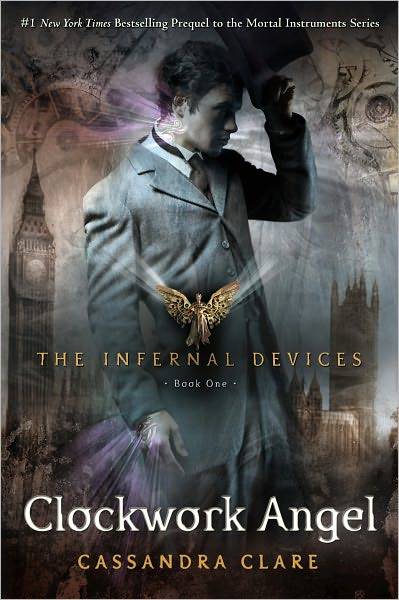

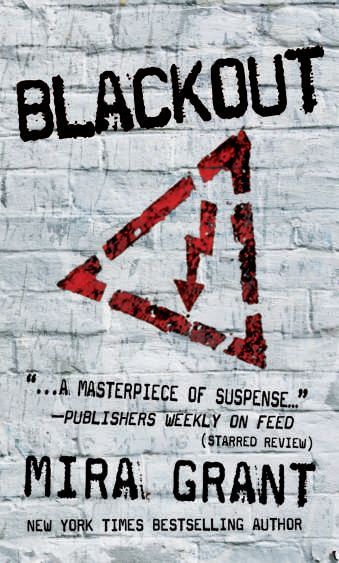
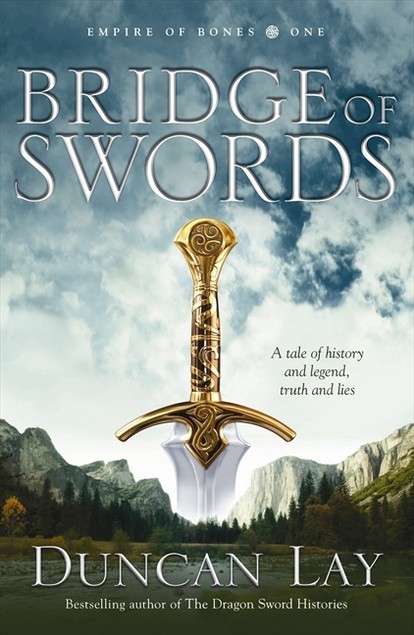
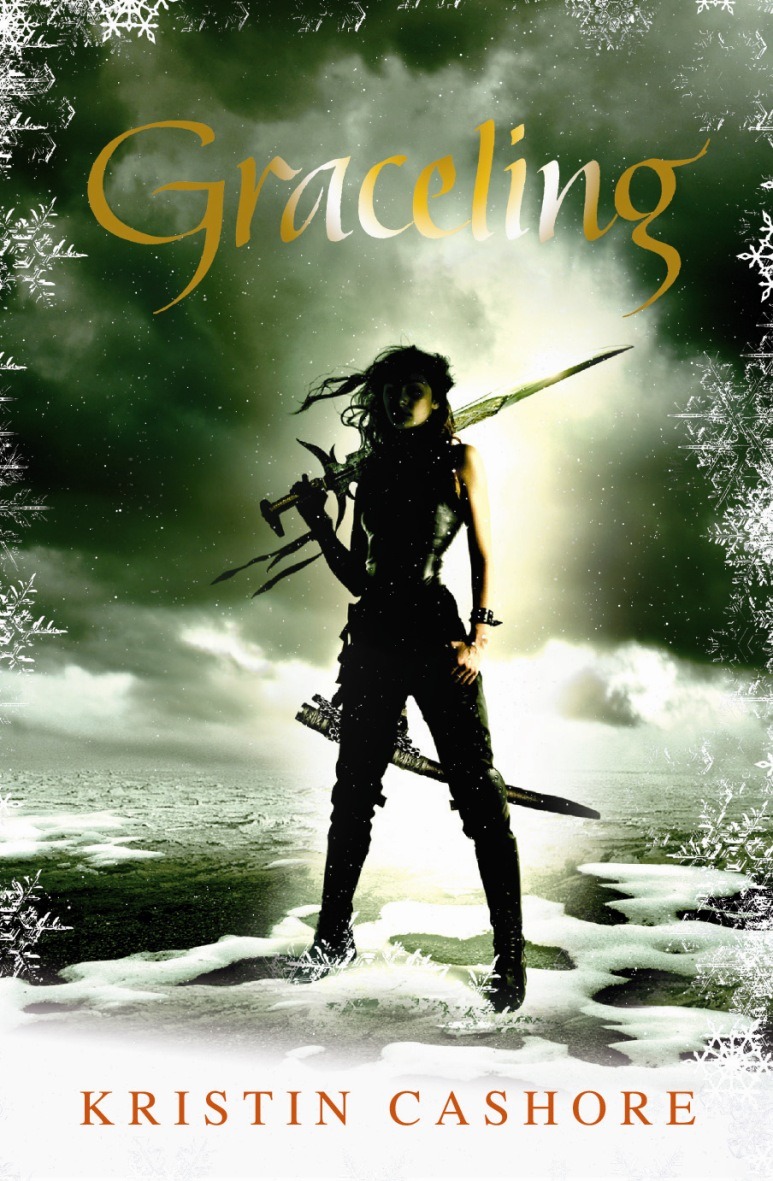
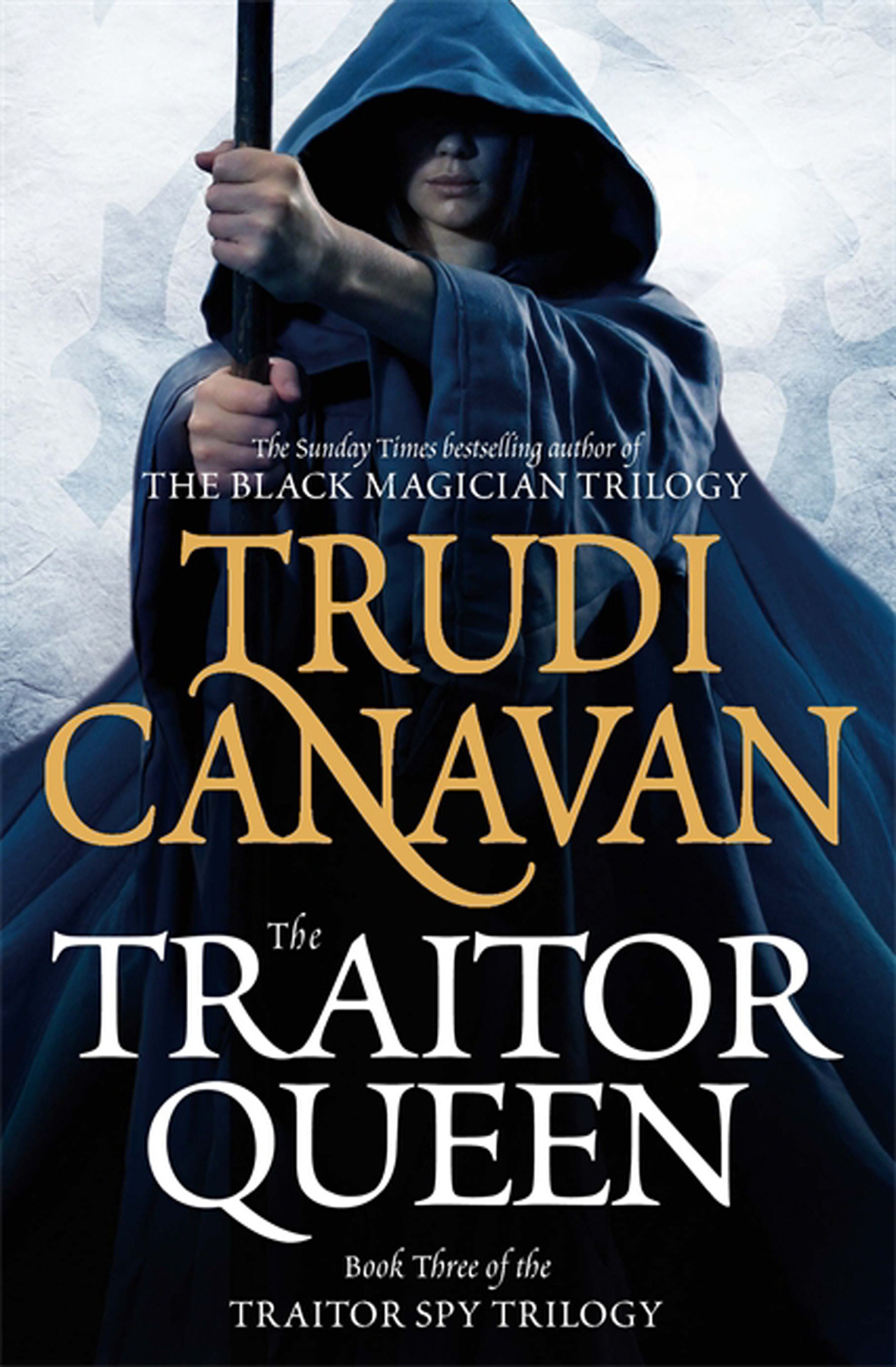
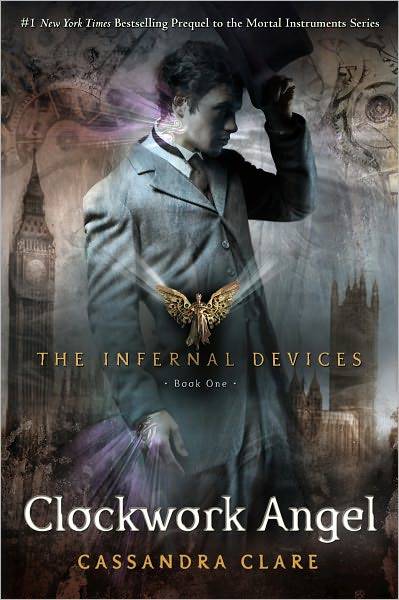
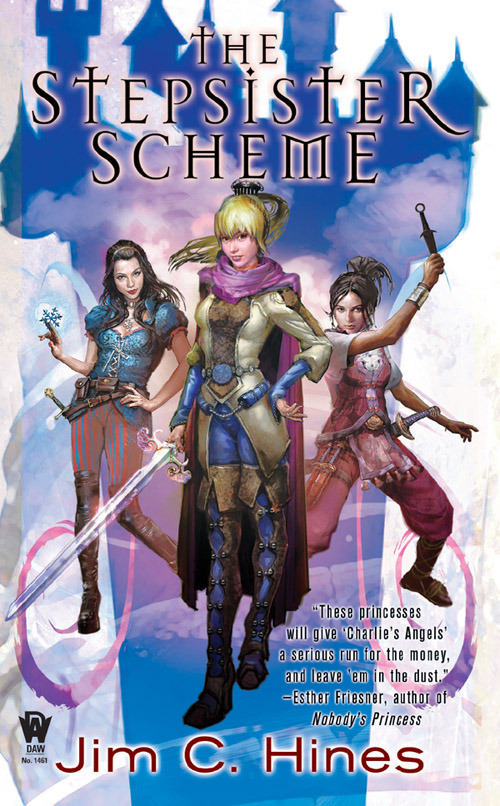
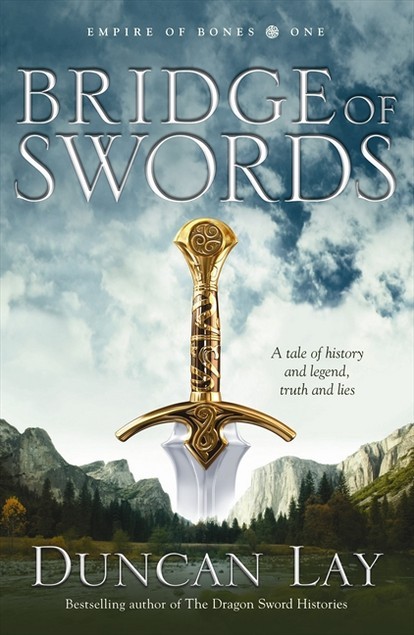 Bridge of Swords is the first book in Duncan Lay’s second trilogy, Empire of Bones. It is set about three hundred years after the Dragon Sword Histories (The Wounded Guardian, The Radiant Child and The Risen Queen), however you definitely need not have read the first series for this one to make sense. Given the large time gap, there are no common characters and in the interim the face of the world has changed significantly so that even those who have read the first series will find it relatively unfamiliar at the start.
Bridge of Swords is the first book in Duncan Lay’s second trilogy, Empire of Bones. It is set about three hundred years after the Dragon Sword Histories (The Wounded Guardian, The Radiant Child and The Risen Queen), however you definitely need not have read the first series for this one to make sense. Given the large time gap, there are no common characters and in the interim the face of the world has changed significantly so that even those who have read the first series will find it relatively unfamiliar at the start.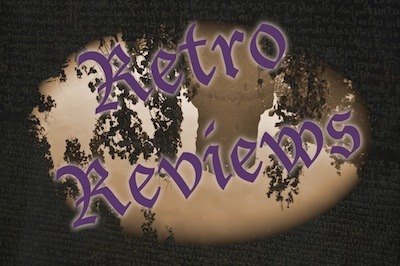 Jennifer Fallon is one of my favourite authors and I have enjoyed all of her books. You can read my review for The Dark Divide, her most recent release,
Jennifer Fallon is one of my favourite authors and I have enjoyed all of her books. You can read my review for The Dark Divide, her most recent release, 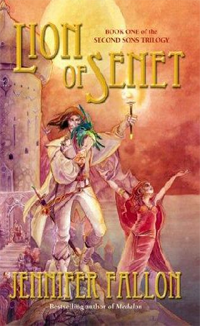 Book 1: The Lion of Senet
Book 1: The Lion of Senet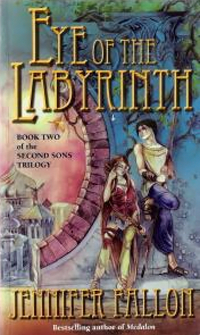 At the start, Dirk, second son of a duke, is apprentice to the duke’s physician. He is uncommonly smart (can do difficult maths in his head) and really wants nothing more than to pursue his studies. Since his older brother is set to inherit, this doesn’t seem to be an unrealistic hope. Until a wanted pirate washes up on the shore and Dirk gets caught up in other people’s political scheming.
At the start, Dirk, second son of a duke, is apprentice to the duke’s physician. He is uncommonly smart (can do difficult maths in his head) and really wants nothing more than to pursue his studies. Since his older brother is set to inherit, this doesn’t seem to be an unrealistic hope. Until a wanted pirate washes up on the shore and Dirk gets caught up in other people’s political scheming. My favourite supporting characters were Alenor, crown princess and cousin to Dirk, and Marqel, acrobat cum social climber. Alenor I liked because of her strength in dealing with the people around her, most of whom didn’t really have her best interests at heart. Marqel I didn’t so much like as a person, but I very much enjoyed reading about her antics. She was the kind of character you want to throttle for her blind ambition. In my opinion, any character that makes you want to scream at the page (because of the emotional connection, I mean, not because they’re poorly written) is an excellent character. I particularly liked how polarising she was with the other characters — some loved her and bought into her scheming while others saw through her straight away, but of course they couldn’t convince the former of that.
My favourite supporting characters were Alenor, crown princess and cousin to Dirk, and Marqel, acrobat cum social climber. Alenor I liked because of her strength in dealing with the people around her, most of whom didn’t really have her best interests at heart. Marqel I didn’t so much like as a person, but I very much enjoyed reading about her antics. She was the kind of character you want to throttle for her blind ambition. In my opinion, any character that makes you want to scream at the page (because of the emotional connection, I mean, not because they’re poorly written) is an excellent character. I particularly liked how polarising she was with the other characters — some loved her and bought into her scheming while others saw through her straight away, but of course they couldn’t convince the former of that.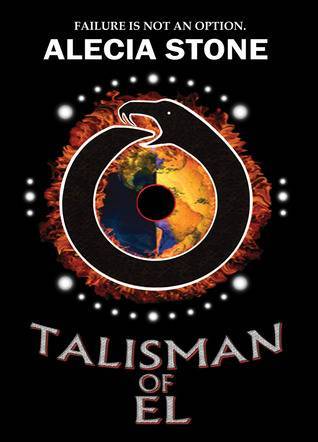 Talisman of El is Alecia Stone’s first novel and the first book published by
Talisman of El is Alecia Stone’s first novel and the first book published by 
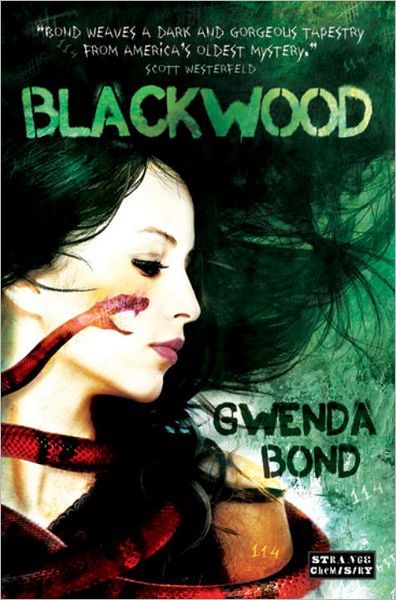 Blackwood is Gwenda Bond’s début novel, out from Strange Chemistry, the YA imprint of Angry Robot, on the 4th of September.
Blackwood is Gwenda Bond’s début novel, out from Strange Chemistry, the YA imprint of Angry Robot, on the 4th of September.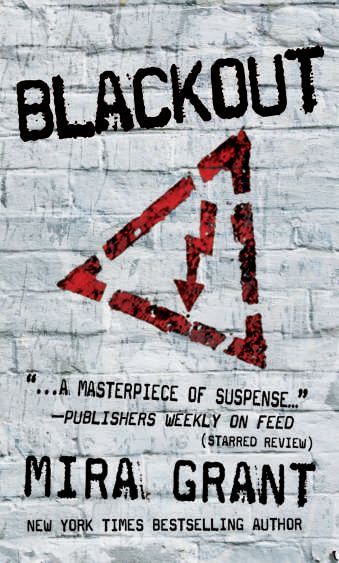 Blackout by Mira Grant is the final novel in the Newsflesh trilogy. I have previously reviewed
Blackout by Mira Grant is the final novel in the Newsflesh trilogy. I have previously reviewed 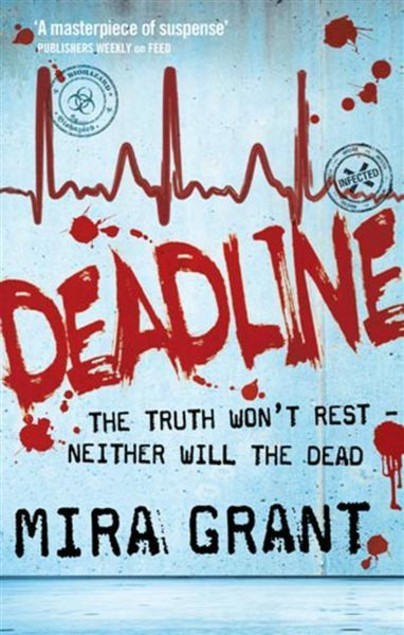 Deadline is the second book in Mira Grant’s Newsflesh trilogy. You can read my review of the first book,
Deadline is the second book in Mira Grant’s Newsflesh trilogy. You can read my review of the first book, 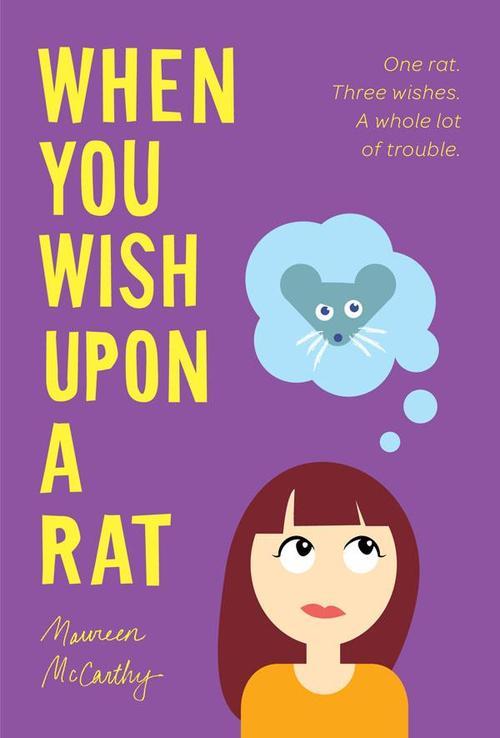 When You Wish Upon a Rat by Maureen McCarthy is the US edition of the book originally released in Australia as Careful What You Wish For. I’m going to refer to it as When You Wish Upon a Rat as I have a review copy from the US publisher ABRAMS. The US edition is due out September 1st while the original Australian edition was published in 2010 by Allen & Unwin.
When You Wish Upon a Rat by Maureen McCarthy is the US edition of the book originally released in Australia as Careful What You Wish For. I’m going to refer to it as When You Wish Upon a Rat as I have a review copy from the US publisher ABRAMS. The US edition is due out September 1st while the original Australian edition was published in 2010 by Allen & Unwin.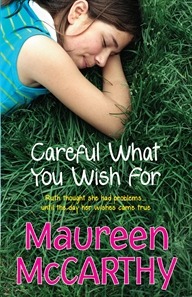 I enjoyed the Australianess of the setting and was glad to see that not all the Australianisms were removed for the US edition. In fact, I think the only changes were spelling and one confusing sentence mentioning “liberal arts” and “math”. All the slang, as far as I noticed, was Australian, which was nice.
I enjoyed the Australianess of the setting and was glad to see that not all the Australianisms were removed for the US edition. In fact, I think the only changes were spelling and one confusing sentence mentioning “liberal arts” and “math”. All the slang, as far as I noticed, was Australian, which was nice.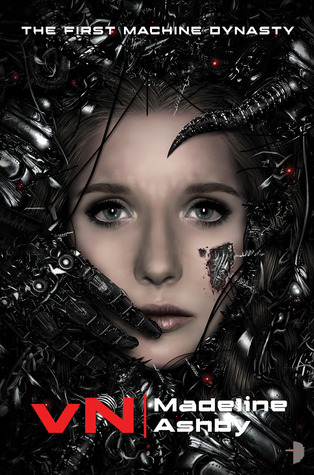
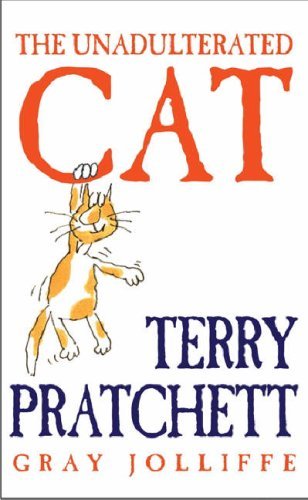 I debated reviewing The Unadulterated Cat by Terry Pratchett and with illustrations/cartoons by Gray Jolliffe. It’s neither fiction nor narrative. It is hilarious however (as though we would expect less from early Pratchett).
I debated reviewing The Unadulterated Cat by Terry Pratchett and with illustrations/cartoons by Gray Jolliffe. It’s neither fiction nor narrative. It is hilarious however (as though we would expect less from early Pratchett). Besieged by Rowena Cory Daniells is the first book in the Outcast Chronicles, which is being published around now (Solaris likes to release trilogies over three months). It’s set in the same universe as her Last T’en trilogy (which is out of print and difficult to find) but in that world’s distant past. You definitely don’t need to have read The Last T’en first (I certainly haven’t, what with being unable to get a hold of it). A copy of Besieged was given to me by the author for review.
Besieged by Rowena Cory Daniells is the first book in the Outcast Chronicles, which is being published around now (Solaris likes to release trilogies over three months). It’s set in the same universe as her Last T’en trilogy (which is out of print and difficult to find) but in that world’s distant past. You definitely don’t need to have read The Last T’en first (I certainly haven’t, what with being unable to get a hold of it). A copy of Besieged was given to me by the author for review.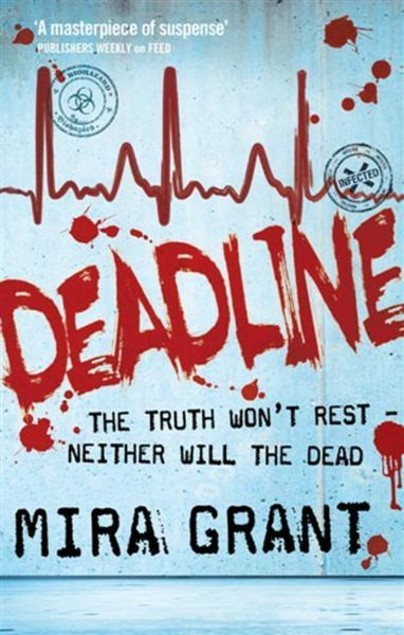
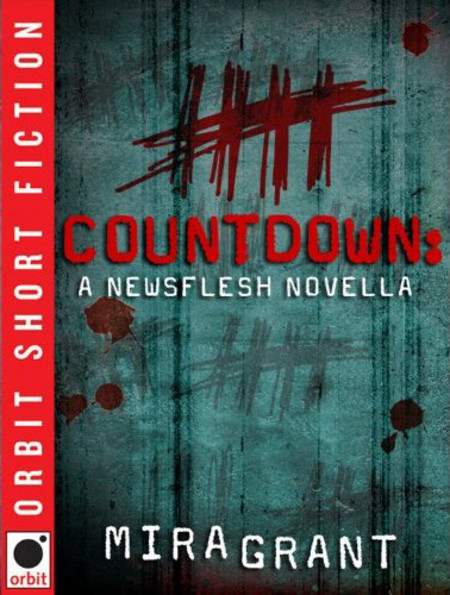
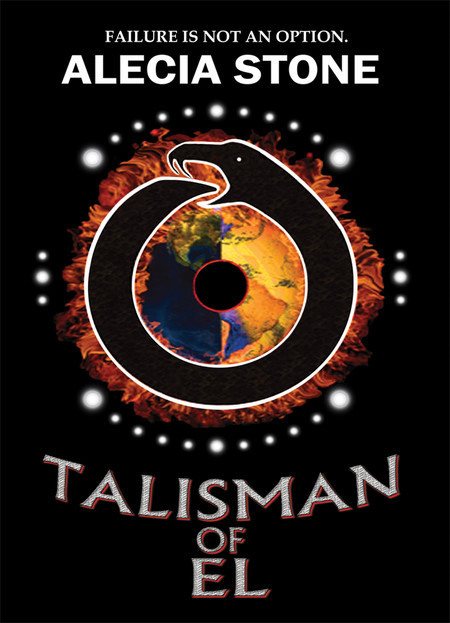
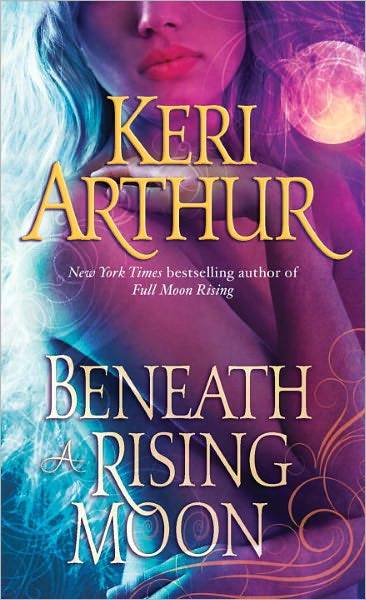
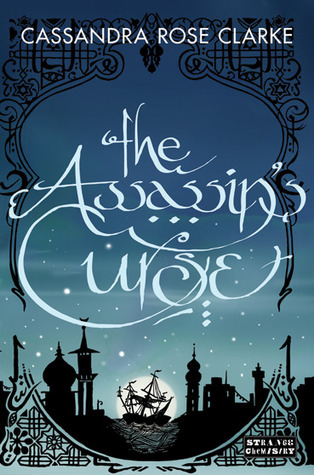 The Assassin’s Curse by Cassandra Rose Clarke is the author’s debut novel, out on October 2nd from Strange Chemistry, the new YA imprint of Angry Robot Books. I was lucky enough to receive an ARC of this novel from the publisher for review purposes.
The Assassin’s Curse by Cassandra Rose Clarke is the author’s debut novel, out on October 2nd from Strange Chemistry, the new YA imprint of Angry Robot Books. I was lucky enough to receive an ARC of this novel from the publisher for review purposes.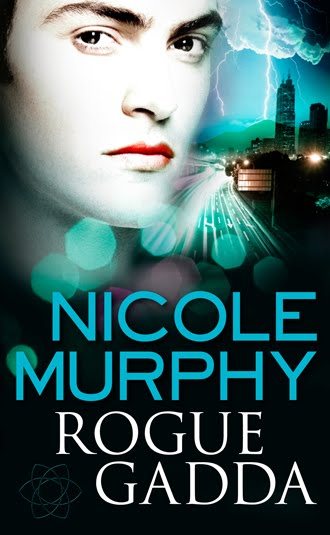 Rogue Gadda by Nicole Murphy is the final instalment of the Dream of Asarlai trilogy. You can read my reviews of the first book,
Rogue Gadda by Nicole Murphy is the final instalment of the Dream of Asarlai trilogy. You can read my reviews of the first book, 